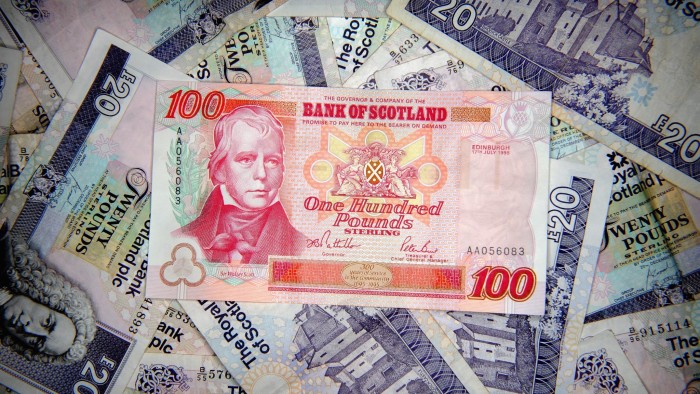Scotland would be downgraded, says Moody’s

Simply sign up to the Currencies myFT Digest -- delivered directly to your inbox.
Scotland will suffer a double downgrade of its credit rating if it votes for independence this year, one of the world’s largest rating agencies has said.
Moody’s on Thursday became the first agency to say what it believed would happen to Scotland’s rating under independence, concluding it would be at least two notches below the rest of the UK.
The agency said the most likely scenario was Scotland would be rated “somewhere in the middle of investment grade, though at least two notches below the UK’s rating. An ‘A’ rating is the most likely at the outset.”
It added that an independent Scotland would be able to raise its rating over time as clarity and confidence grew about Scotland’s “institutional structure and measures to address longer-term fiscal issues”.
Pro-unionists welcomed the news. Danny Alexander, the Treasury chief secretary, said: “As part of the UK, Scotland can avoid a double downgrade for its credit rating and maintain lower borrowing costs for Scottish businesses and families.”
Mr Alexander also noted the conclusion that sharing the pound with an independent Scotland would harm the rest of the UK.
Moody’s said it would be “credit negative” for the rest of the UK, if Scotland kept the pound as its currency and the Bank of England as its central bank, “regardless of the institutional arrangements that are put in place”.
This bolsters the argument made by Mr Alexander and George Osborne, the chancellor, that a currency union would be damaging for the UK and so was not on the table during independence negotiations.
However, Scottish nationalists insisted an independent Scotland would continue to attract investors. A spokesman for John Swinney, the Scottish finance minister, said: “Scotland’s public sector debt is lower than the UK’s, and lower than the EU and G7 average, confirming our underlying economic strength.”
One Scottish government claim Moody’s did support, was that independence is unlikely to have implications for the rating of government debt issued by the remainder of the UK.
This contrasts with the verdict of rival rating agency Fitch, which warned this month that a ‘yes’ vote in September’s referendum on Scottish independence would make the recovery of the UK’s triple A rating a more distant prospect.
Moody’s took a more relaxed view of the implications, citing Scotland’s small size relative to the UK economy, and the likelihood that an independent Scotland would receive an investment-grade credit profile.
However, the agency did note two big risks to this assessment: the potentially fraught division of the UK’s debt obligations, and continued uncertainties associated with the currency arrangements after independence.
In the event of a yes vote on September 18, the Scottish National party wants to maintain a sterling currency union – an option that has been ruled out by all three main Westminster parties.
Moody’s said one positive credit implication for the rest of the UK was that Scottish independence would eliminate the fiscal transfers between Scotland and the remaining regions of the UK, improving fiscal dynamics for the rest of the UK because per capita public spending is higher in Scotland and its demographic profile older.
It said any division of revenues from North Sea oil would be largely credit neutral for the remainder of the UK, because they were small and declining, relative to the size the UK economy.
Moody’s acknowledged risks to its assessment would arise if Scotland refused to assume a “fair and proportionate share” of its debt obligations, which would increase the UK’s net debt burden and would be considered credit negative.
London has promised to honour all existing British government debt of about £1.2tn and seek a contribution from the new Scottish government. Scottish ministers have repeatedly threatened to walk away from the debt if London refuses to agree to a formal currency union.
A theme tune for the union
A new group formed to campaign against Scottish independence hopes to give grassroots supporters of the union a musical boost with release of a “folky anthem” ahead of the September 18 referendum, writes Mure Dickie.
Announcement of the No Borders Campaign comes as polls show rising support for independence. Some politicians say the official cross-party Better Together campaign against leaving the UK is struggling to match the grassroots activity of the Yes Scotland and a clutch of other pro-independence groups.
Malcolm Offord, a Greenock-born former private equity partner who registered No Borders as a campaign participant, said the group’s creation was not meant as a criticism of Better Together, which he said rightly focused on the big political issues.
But he said a loose coalition of supporters, each of whom had contributed a maximum of £5,000, felt there was a need for a forum for “ordinary” pro-union voters previously unheard in the debate.
“What we want here is a bit more organised chaos,” Mr Offord said. “Lots of people are not comfortable talking about politics – this forum will let them talk.”
The group has already raised more than £150,000 but hoped to gather about £400,000. Spending limits mean most of that would have to be spent before the start of the formal campaign at the end of this month.
Mr Offord said that as well as hosting video contributions from voters on its website, the group was looking at press and cinema advertising. A priority would be promotion of a campaign theme tune described as a “folky anthem”.
Mr Offord said: “We want to get it out on the airwaves.”
Comments